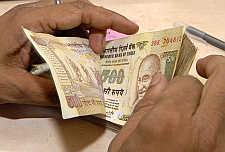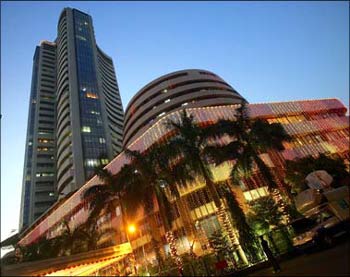 External pressure rather than local economic conditions are behind the high current account deficit, says Rajesh Cheruvu, below, left, Chief Investment Officer, India, Royal Bank of Scotland.
External pressure rather than local economic conditions are behind the high current account deficit, says Rajesh Cheruvu, below, left, Chief Investment Officer, India, Royal Bank of Scotland.
Removal of supply-side constraints and investor-friendly policy reforms are key to boosting growth, he tells Rediff.com's Faisal Kidwai in an interview.
Why is the rupee falling and what should be done to arrest its decline?
In the past one month, that's largely led by the strength of the dollar against most of the currencies and combined with the portfolio outflows since Federal Reserve's indications to taper bond purchase programme. Earlier, high trade deficit led by gold imports in May 2013 have caused some worries. However, the first quarter current account deficit data has soothed these concerns. As long as global portfolio flight is not stalling or the dollar giving up some gains, we are unlikely to see profits for the rupee. Given the lower inflation in the United States, the Fed is unlikely to taper bond purchases sooner. As clarity emerges on this front, we could see some stability with the appreciation of the Indian currency.
What is needed to address the current account deficit situation? We are witnessing a recovery in US-led exports since the first quarter of 2013, as recovery in Japan and eurozone markets gains momentum. Also, the recent court-directed restarting of iron ore mine work could help recovery of ore exports. Add to that, the recent strictures on gold imports combined with ongoing subsidy rationalisation and weak demand to reign in both oil and non-oil imports. Hence we expect to see further progress in CAD outlook from 4Q CY13. Given the high dependence on import of commodities and external capital, I don't think that domestic policy alone will be able to provide stability. For now, it's more of external pressure rather
We are witnessing a recovery in US-led exports since the first quarter of 2013, as recovery in Japan and eurozone markets gains momentum. Also, the recent court-directed restarting of iron ore mine work could help recovery of ore exports. Add to that, the recent strictures on gold imports combined with ongoing subsidy rationalisation and weak demand to reign in both oil and non-oil imports. Hence we expect to see further progress in CAD outlook from 4Q CY13. Given the high dependence on import of commodities and external capital, I don't think that domestic policy alone will be able to provide stability. For now, it's more of external pressure rather
Some say that non-performing assets are a growing problem for banks. In your view, what should be done to bring down NPAs?
Yes, in the past eight quarters, delinquency rates have gone up as corporate sales as well as profitability came under pressure. However, on the basis of S&P's recent reports, it appears the worst is behind us. As inflation falls further and a favourable monsoon develops, it could revive demand in the current quarter. Further policy rate cuts with improvement in liquidity could make way for lower lending rates. Which could help revive discretionary consumption from 4Q CY13. Overall, as environment improves, the NPA additions are likely to fall reasonably.
What are some of the urgent reforms needed, and do you see any of them happening before the general elections?
For returning to trend growth of over eight per cent GDP growth and sustained low inflation of four per cent, removal of supply-side constraints and investor-friendly policy reforms are key. Namely, land acquisition, mining and minerals allocations, comprehensive tax reforms -- GST and direct tax code, administrative reforms -- public office accountability, grievances redressals, protection to whistle-blowers and allowance of foreign capital into investment starved sectors, such as infrastructure and financial services.
Further, lowering political interventions in the decision-making process by setting up of independent regulators for key infra sectors -- coal pricing, rail tariffs and roads sectors. Given the limited political mandate, we don’t expect legislative reforms progressing further until elections are over. However, in the last few weeks, we did see some executive decisions been made to revive the investment demand.
Also, expect to see simplification of foreign direct investment rules by allowing FDI on automatic route into companies within the stipulated sectoral limits. This could help remove hardship of investors in terms of waiting for prior approvals before bringing capital into the market. Also, the recent decision of gas price revision and coal price pooling have removed overhang in capital-starved sectors, such as energy and power.











